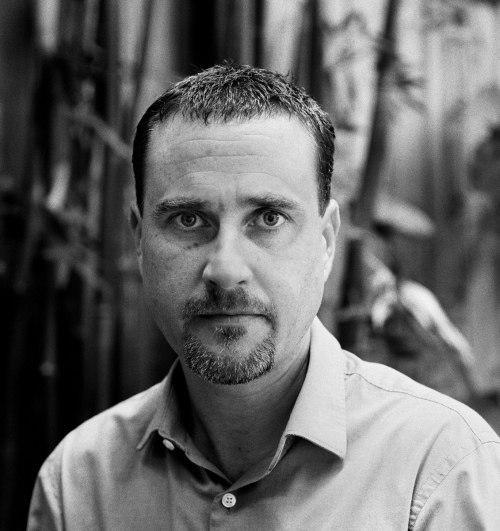Weston Cutter's Blog, page 11
May 8, 2014
Of God and Gangsters: A Brief Interview with Zachary Lazar
Zachary Lazar’s (Sway, Evening’s Empire: The Story of My Father’s Murder) latest novel, I Pity the Poor Immigrant, delves into the dangerous world of the real-life Jewish mafia, its crimes and it’s characters, most notably the gangster Meyer Lansky, a man who tried desperately to return to Israel even after his convictions. Through the eyes of journalist Hannah Groff, Lazar creates a story of loyalty, loss and the search for God and redemption. It’s a great read.
Lazar was great enough to answer a few of my questions about the novel and his inspirations for the story:
I’m curious about what brought you into the story of Lansky’s life. What was it about him that fascinated you?
My previous book, EVENING’S EMPIRE, was about my father’s murder. He was killed by Mafia hit men hired by a crooked businessman whom my father worked for. This businessman, it turned out, was a kind of latter-day Jewish gangster. This forced me to research organized crime, particularly its Jewish iteration, and this led me to the figure of Meyer Lansky. Lansky led a quiet life of concealment–everything was secret–so it was difficult to see a story in his biography. What finally resonated for me was Lansky’s complicated relationship to Israel, where he wanted to live. Israel rejected him, and it never stopped tormenting him.
I can’t help but compare this novel to “In Cold Blood” – another crime story with personal aspects intertwined. Sure, the “person” in the story may be fiction, but it still feels like the best reference point. How do you feel about that comparison?
My last three books have all been influenced by IN COLD BLOOD. Capote claims that everything in his book was reported, that there was no invention in the very detailed evocations of place and action, for example. I find this claim hard to believe, though I still think his book is a masterpiece. In any case, as far as my own work goes, I am careful to stay within the bounds of what we know about actual people from the historical record. I don’t make up the big events in their lives. I try to get inside their skin and imagine what it was like to live through those big events.
The stories about King David scattered throughout – I’m wondering about your relationship to these stories. Coming from a Christian background, these are all tales I’ve heard before, but never *fully* took into account how tragic they were. What made you connect them with Lansky? (I have an idea that David is sort of the ‘anti-Lansky’ – the guy you expect to be a hero/true follower of God doing these horrible things, whereas Lansky’s the guy known for his horrible things trying SO HARD to get closer to God/his homeland. But I could have read that wrong…)
No, you read it correctly. I went into the novel with a wild (and in a way quite stupid) hunch that there was a parallel to be drawn between Lansky and David, two tough Jews, one modern, one ancient. It took me a long time–more than a year–before I found a way to at least beginning making something interesting and, I hope, meaningful out of the juxtaposition.
In the most basic terms, what are you hoping people take away from this story?
Well, the true answer to that is that the answer is 250 pages long–the book itself. The shorter answer, though, is that although my novel is about Jews, it’s really about human beings in general: their insatiable dream to transcend the finite and often brutal circumstances of real life in favor of a spiritual world that is infinite, unattainable, and yet absolutely essential.
What’s your bookshelf look like? What kind of stuff are you reading so often it doesn’t even sit on the shelf? What stuff are you constantly drawing from?
The big ones are the novels of Joan Didion, Philip Roth, Don DeLillo, and the short stories of Deborah Eisenberg. I’m also always re-reading Flaubert, Tolstoy, and F. Scott Fitzgerald, the last of which was the writer I most wanted to be like before I knew any better.


May 6, 2014
A Fresh New Voice to Get Your White Privilege in Check
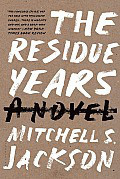 “The Residue Years” by Mitchell S. Jackson
“The Residue Years” by Mitchell S. Jackson
I’ve mentioned this before on the site, but I am white. Very white – I’ve never been discriminated against because of color, asked to empty my pockets in a store, worried about getting service in a bar or restaurant, had to think about what colors I would wear that day based on the neighborhoods I would be in.
On the same line, I was raised amazingly middle class. I lacked no essentials growing up. My family never had to choose between necessities or worry about making the mortgage or even make me pay for the total of my education (at least that I know of).
The reason why my race and class is important in this review is simple: all I know about growing up black, growing up poor, growing up with any real disadvantage is what I’ve learned from books and other people’s stories.
I used to tell people I read so much because I was the most boring person in the world – I had to take on other lives and perspectives. Mitchell S. Jackson’s The Residue Years is exactly the type of story I love taking on, simply because this is shit I’d never know and never experience if not for reading amazing first-person stories like this.
The novel itself isn’t a strict autobiography, although it could be. Jackson’s a young black male from a poor neighborhood in Portland, one of the whitest cities in the U.S, who moved onto writing after spending his younger years in prison for drug crimes. God, it’s crazy to think about all the talent sitting around in our jail cells – it’s foolish to think Jackson’s the only smart writer who’s done time.
To the novel, which is told through the eyes of two family members whose lives are torn by the crack epidemic. First, there’s Grace, mother of four boys, just out of rehab (again), trying her hardest to put her faith in God, the program and the goodness of others. Then, (and I’d love to know just how autobiographical this character may be), there’s Champ, a college boy who’s got a way with words, but finds more success and better means for his family by selling on the streets.
The goals of this family are by no means monumental. Champ wants to keep the family home in their possession, wants to set a good example for his little brothers, help keep his mama clean and take care of his girl, the love of his life beauty Kim. Grace just wants to make it this time. She wants to apply for jobs and tell her employers the truth: she’s been busted, gone through rehab, done some wrong, but can work like no other. And later, when her ability to care for the younger boys is called into question, just wants to keep her family intact.
It fucking runs them though, the drugs. Without constant support, without a sign from God or seeing the smile of her boys, it’s hard for Grace not to slip back into her own ways. And when Champ needs money – not for flashy new shoes or to blow on weed – maybe for school, maybe to pay rent on the family home, or later, to provide for his pregnant girlfriend and the upcoming child, the easiest/surest way for a guy of his race/class/status/neighborhood is to hustle.
Geez, I don’t know if there’s a whole lot more for me to say. This is so far from being my story to tell in any way. The writing is terrific, I can’t believe how fresh a voice Jackson’s got. Really though, if you’re in the same boat as me (privileged, white, privileged because you’re white), please read this.


May 1, 2014
If Alienz entered The Great Gatsby… The Bend of the World
 Jacob Bacharach’s THE BEND OF THE WORLD
Jacob Bacharach’s THE BEND OF THE WORLD
It’s weird how much a book that’s supposedly about aliens feels like a modern day Great Gatsby. Scattered, boozy, filled with excess, green lights and less-than-faithful relationships, Jacob Bacharach’s The Bend of the World reads like dystopian Fitzgerald.
So it starts out that the skies of Pittsburgh may or may not be filled with flying saucers and alien interactions. At least, people are saying that they’re seeing these things all over, but, no one can really know whether these people are nuts, drunk, in it for the story or hypochondriacs. The mayor is definitely telling people the whole aliens things is bullshit after the blog dedicated to extraterrestrial sightings photoshopped together this picture of him getting probed in a less than hetero-sexual fashion.
Peter Morrison sees a saucer or a spaceship or a drunken blur one night, and basically the rest of the story is a long, drawn-out pondering of whether what he say was in fact aliens, or more like, a metaphor for the end of the world, or maybe the end of his world, or maybe just the end of a specific aspect of his life.
Am I misleading you? This book is really, hardly about aliens, despite what the cover may make it look like. What it is like are the following words: dark, comedic, disorganized, disjointed, rambling, erratic, amazing,
Seeing the spaceship of course happens on the night Peter’s life is just undergoing this big shakeup. Previously, he was just this office drone guy that didn’t do any real droning, or really, anything during his hours sitting at a desk he refuses to decorate. He’s seeing this girl with two first names, Laura Sara, who makes art that basically looks like chairs, or at least sculptures that would confuse visitors in art galleries over whether or not this is an exhibit or a rest area, and his best friend at this point is gay-butterfly Johnny. It’s not that he’s even dissatisfied with his life at this point; Peter Morrison is just ambivalent to the entirety of it.
Then there’s the night he sees the flying saucer – or well, he thinks he does. It’s also the night he meets this Buchanan-esque couple, Mark and Helen, and drinks so much with the two of them it makes me dizzy thinking about it. Back to the Buchanans: Mark’s the new man in Peter’s office (his office, by the way, is hilariously blank. Called Global Solutions, their motto is essential –not quoted here- “Global Solutions for a Global World.”), with some mysterious, maybe lawyer-type job that seems essential to be the role that George Clooney had in that one movie “Up in the Air,” where he plays that like, super corporate guy that offices hire to come in and fire their employees so they don’t have to. Then Helen. Helen is just, I don’t even know, the perfect girl maybe? She’s great at pool, glamorous to the point she’s over it and a true artist like Laura Sara would love to be. Peter is instantly obsessed with these two.
It hurts though – could Gatsby and Nick have been the same character? Could the main male in the romance section of the book be the same, impartial, along for the ride, reveling in the new money Nick? It’s as if the two guys – one striving for everything (the wealth, the name, the girl), the other watching and waiting – balanced each other, creating a whole new, 21st century person named Peter from the foils.
To balance out how lit-nerd that last paragraph was, plus, to get you acquainted with how scattered this book is, here’s a list of other topics this book covers: Bigfoot (or Sasquatch, if you will), Keurig coffee refills, Nazis, strip clubs, Alieyinz, funerals, drugs, etc. There’s a lot going on. It’s incredibly fun.


April 29, 2014
The Most Famous American Outfit in Novel Form
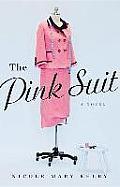 Nicole Mary Kelby’s THE PINK SUIT
Nicole Mary Kelby’s THE PINK SUIT
Contrary to the title, Nicole Mary Kelby’s “The Pink Suit” is hardly about Jacqueline Kennedy at all. What it is about: Immigrants, the American Dream, patience, dedication, expectations, presentation and, in the broadest terms, love.
Kelby offers a totally original and unexpected angle than what I expected from a story called “The Pink Suit.” I thought it might be a fictionalization of Jackie’s accounts, tales and tragedies. I don’t even remember if the first lady herself has a full line. I thought it could be the tale of some 20-something making-it-on-my-own wearing her first Chanel pink suit doing some cool new job in the big city, sorta Mary-Tyler-Moore-esque. Not so (although, the more I think about what I would expect, the more I’m realizing, why isn’t this a novel? I should totally make this series; it could be the next “Confessions of a Shopaholic.”) The angle Kelby does take is telling the (fictionalized) story of Kate, the seamstress who created and cared for every inch of that famous pink suit.
Hold the phone, you say. That pink suit was made by Chanel!! (Guys, am I losing you? I feel like 85% of American women have some awareness of this fact; it’s not even a fashion thing, it’s an Americana thing). It’s true that the suit was designed by Chanel, the cut and color dreamt into creation by the Parisian fashion house, but, as Jacqueline was criticized for pouring money into the design houses overseas and spending frivolously on non-American goods, a new standard had to be set. The First Lady’s clothing could be Chanel designs, but they must be American made.
This is where Kate comes in. An Irish-Catholic Immigrant, Kate’s job in the couture Chez Ninon dress shop offers her a glimpse into a world of elegance, opulence and fashionability almost opposite from her national roots and her close-knit neighborhood. Although she could never imagine sporting such decadent clothing, Kate spends her days crafting the luxurious wear of East-Coast royalty, including, after commission, the First Lady.
Note here: It’s incredibly interesting the way they discuss Jacqueline in this novel, as I’m assuming is evident of the time. For one, I’m totally used to calling her Jackie O., or Jacqueline Kennedy; more often than not, in this novel, the First Lady is just referred to as “the Wife.” It’s so crazy to think about in our generation, when ‘the wife’ is often way more popular than her husband. I mean, could you imagine the Vogue cover of Michelle Obama saying “How she supports Hubby,” or “The First Wife,” rather than the headline they ran with in 2009, “The First Lady the World’s Been Waiting For,” as if it’s she herself we put into office. And really, I have like, zero idea what Kate Middleton does all day (I assume powder her baby and buy Burberry), but we absolutely knew what she wore doing it, while when asked what William did that day…
What I’m trying to get at here: it’s odd to be seeing this time period where the women are seen as an aspect of the man’s personality (just “his wife” rather than “herself”) instead of her own heroine, even more so with this amazing strong, groundbreaking woman (she’s the reason I can buy mini skirts mainstream today and it’s incredible!!)that lived on past her husband, making her own right as an American Icon.
Back to Kate: the harder she works on this suit for ‘the wife,’ the more she’s torn between passion and convention (is this a missing Jane Austen novel??). There’s two paths she is being asked to follow: first, opening shop and becoming the star seamstress of this New York fashion house, or two, settling down and becoming the wife of the man she loves, the humble butcher Patrick. The first offers a life of glamour, albeit a lonely one. The second, love, caring, a family, but nothing to brag about. It’s so clear to us now, hey! why doesn’t she just marry the butcher and leave at 9 am for the fashion house? Women can have it all!!! But of course, this is the 60s, pre-Betty Friedman-feminism and that possibility seems absurd.
Is this sounding like a period piece chick lit? It totally is. But you know what else is very time specific, work-versus-love, passion/convention tale of the working woman? Nora Ephron’s “You Got Mail.” So what if people think you’re going in for an ultra-feminine read? People that right off female-drive lit in this day and age are probably still the same people calling Jackie O. “the wife.” Which means: they’re out of it. Screw it ladies (and guys that I haven’t lost at this point), read this because it’s fun and you’ll understand it, and it’s eye opening, and you’ll love it.


April 22, 2014
Krista Bremer’s “Accidental Jihad”
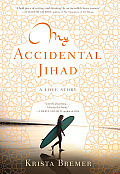 “MY ACCIDENTAL JIHAD” by Krista Bremer
“MY ACCIDENTAL JIHAD” by Krista Bremer
We should probably start by pinning down what ‘jihad’ means, because a lot of Americans basically associate that word with “Holy War / Reasons for 9-11 Type Terrorism.” That’s really not the case. In the Islamic definition, jihad simply means “struggle,” or in many cases, “to struggle in the ways of Allah.” It’s an important difference to pick up – please don’t start reading this book thinking you’re getting the story of some white lady accidentally lured into a holy war / anti-American extremist group. That couldn’t be further from what’s going on here.
What is this memoir about? Marriage, and what makes a relationship work more than anything. Plus, it’s about author Krista Bremer’s struggle to understand and fully respect the religion of her husband. But really – if you’re going to pick this book up as a primer on a white lady explaining Islam to another white person, you should probably look somewhere else – it’s better as a woman explaining how to listen, love and learn from each other in marriage.
Also what this book isn’t: the tale of a white woman going full-out Islamic, subscribing to her husband’s rules and cultural regulations, adopting the traditional hijab and conservative clothing you traditionally think of when you call to mind Islamic clothing. Really, Bremer and her relatability to whites (me), non-Muslims (me), feminists (me) and women in general are what make this memoir work so well.
The story starts off with a young, fresh-faced Bremer, just out of college with her Women’s Studies classes and English lessons in hand. She’s working at an abortion clinic, interviewing women before their procedures, informing women whether or not that little pink lines shown up on the test. To state the obvious: she’s not in a job for a weak woman, or one who’s of the assumption enabling abortions is gonna get her in trouble with some higher power. At this point, she’s a part-time Buddhist, although one that ignores the rules she doesn’t like (i.e. no alcohol) with conviction.
Bremer’s still young when she moves away from this job, s to the other side of the country. She’s a strong, independent woman in this new setting, running miles along the trails in her new neighborhoods. It’s here where she meets this strange new man, Ismail, a guy that surprises her with his wisdom, his passions and his dedications to his God. Before long, she finds herself in a situation she never expected: young, pregnant and eloped to an older man with a background vastly different from her own. Of course, it’s a crazy big decision for Bremer to keep this baby and the man who fathered it – you can read for yourself the reasons why she makes this choice.
What’s most important in the story is what follows: Bremer’s education into her husband’s past life growing up in a poor Libyan village, what she learns about her own unconscious prejudices and her own selfishness and failings.
A good portion of the book is dedicated to the story of the couple and their daughter’s first trip home to meet his parents, still living across the world in a Gadhafi-ruled Libya. Of course, there are language barriers and cultural barriers – Bremer can barely communicate with her sisters-in-law or mother-in-law, yet she’s not allowed to sit with Ismail and talk with the men. She’s entering the country with a hatred of Gadhafi and his regime, which is only strengthened by the things she sees during her time there (did you think she’d turn around her opinion, realize she was being racist for judging his way of operating without truly experiencing it? The memoir’s not that stupid). Here, she comes into contact with her shortcomings and prejudices as well as a greater appreciation for her husband’s wisdom and his own strain of feminism.
There’s a significant amount of the story telling about Bremer’s own resistance to Islamic culture, a thing her husband never forced upon her. Their children, it turns out, is the one to most notably reflect the differences between the couple’s lives. Bremer struggles when her beautiful little girl desires to wear hijabs to school and to the mosque and tries to fight her husband’s desire to have their son circumcised in accordance with his religion. It’s fascinating to see this choice of religion through the eyes of a little girl – at this point in my life, I wouldn’t be attracted to wearing a headscarf, but as a child, would it seem glamorous?
What am I doing here? It’s always difficult to describe memoirs to you without ruining the whole book. I guess I’m just trying to prove to you a few basic things: (1) you can read this book and learn no matter what your religion/background (2) you’re gonna learn more about what it takes to make a marriage work than what it takes to be married to a Muslim from this book (3) you shouldn’t be offended (4) you won’t feel preached to and (5) it’ll still probably open your eyes to what it’s like to live in a bi-cultural/religious marriage. So, I’m going to stop trying to summarize Bremer’s story in my own words and just tell you – go read it yourself, please. This is a beautiful story.


April 20, 2014
Dirty and Lovely
A review of Andre Dubus III’s Dirty Love
I probably don’t have to sell you on the merits of Andre Dubus III (and if I do, check out Weston’s interview with him here). I mean, House of Sand and Fog? Garden of Last Days? Townie? Dude is one of the most talented storytellers around today–in my humble opinion–and has a twistedly keen sense of voice. Even more impressive is how he always seems to get away with things that, coming from other writers, would flat. Case in point: Dirty Love, D3′s latest book, a collection of four linked novellas, each of which illustrates some aspect of the human propensity for self-sabotage. I won’t tell you that Dirty Love is the best thing that D3 has published to date, but it’s still up there, a stirring read full of complex characters struggling (in typical Dubus fashion) to wring some sense of enlightenment out of their mistakes.
 The book opens with “Listen Carefully, As Our Options Have Changed,” a slowly-paced story about a middle-aged project manager named Mark Welch who has recently discovered that his wife is having an affair. This knowledge comes to Mark through a DVD provided by a private detective he hired to follow his wife Laura and her lover, a high-ranking bank exec. Next there’s the eponymous “Marla,” in which our main character, a lonely and heavyset bank employee, searches for romance at the urging of her coworkers, only to find that their version of romance is far more complicated than she initially believed. In “The Bartender,” we follow Robert Doucette, beerslinger at the swanky Whaler Restaurant on Massachusetts coast, as he steadily sabotages his relationship with his pregnant wife. Finally, there’s the title story “Dirty Love,” in which a young waitress at the Whaler frantically attempts to distance herself from a humiliating sexual encounter that has been documented online, seeking refuge in the dark anonymity of Chatroulette.
The book opens with “Listen Carefully, As Our Options Have Changed,” a slowly-paced story about a middle-aged project manager named Mark Welch who has recently discovered that his wife is having an affair. This knowledge comes to Mark through a DVD provided by a private detective he hired to follow his wife Laura and her lover, a high-ranking bank exec. Next there’s the eponymous “Marla,” in which our main character, a lonely and heavyset bank employee, searches for romance at the urging of her coworkers, only to find that their version of romance is far more complicated than she initially believed. In “The Bartender,” we follow Robert Doucette, beerslinger at the swanky Whaler Restaurant on Massachusetts coast, as he steadily sabotages his relationship with his pregnant wife. Finally, there’s the title story “Dirty Love,” in which a young waitress at the Whaler frantically attempts to distance herself from a humiliating sexual encounter that has been documented online, seeking refuge in the dark anonymity of Chatroulette.
Each novella is crafted in the long-winded-but-still-somehow-succinct prose style for which D3 has become known. Much of the characters’ lives is told to us through third-person omniscient narration, a tactic that works surprisingly well by underscoring how little these characters actually know about themselves. However, it can also be overwhelming at times, the amount of exposition that is simply handed to us; at times I felt myself growing frustrated over D3′s habit of over-explaining the characters’ actions to us rather than simply letting them act. Then again, an argument could be made that this necessary in order to get us into the characters’ heads; like them, we find ourselves feeling trapped, in need a breather.
For the most part, the narratives here are fresh and memorable. D3′s characters always manage to make predictable behaviors seem shocking and illicit. At times, the book does slog into “precious” territory, particularly in “Marla” and to a lesser degree in “Dirty Love.” On one hand, this seems unavoidable when writing about the hidden lives and misdeeds of seemingly normal people (which is really it’s own sort of cliche, if we’re being honest here). Nonetheless, it’s frustrating when the characters continually say things like, “Oh, I missed you, Marla!” and “Can we make love when we get home?” Maybe this really is how people speak and I’m just a troglodyte, but in the context of D3′s writing it tends to come across as things that are are supposed to be said. We begin to feel the author’s presence a bit too sharply. It would have awesome been to see what would happen if D3 were to loosen the reigns a little, let these characters communicate more fluidly on their own, thereby allowing the reader into the scene rather than holding us at arm’s length as passive observers.
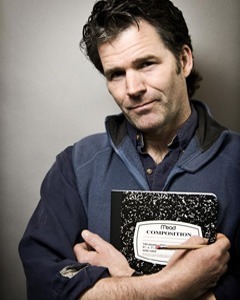 But then I suppose he sort of wanted us to feel that way because that’s how so many of the folks in Dirty Love actually feel–buffered from their own lives, helplessly watching them tick by. To be sure, these are not unique characters; you’ve encountered them before in other stories (probably by white dudes). But Andre Dubus III is skilled enough to at least make them compelling all over again and to make us care about them, That’s where the book really succeeds, I think: we know these people are bound to fail, and yet we continue to root for them. And it’s worth a little heavy-handed prose to see an author pull this off so artfully.
But then I suppose he sort of wanted us to feel that way because that’s how so many of the folks in Dirty Love actually feel–buffered from their own lives, helplessly watching them tick by. To be sure, these are not unique characters; you’ve encountered them before in other stories (probably by white dudes). But Andre Dubus III is skilled enough to at least make them compelling all over again and to make us care about them, That’s where the book really succeeds, I think: we know these people are bound to fail, and yet we continue to root for them. And it’s worth a little heavy-handed prose to see an author pull this off so artfully.


April 17, 2014
All The Birds, Singing, All the Time, Please.
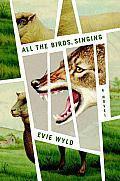 Evie Wyld’s ALL THE BIRDS, SINGING
Evie Wyld’s ALL THE BIRDS, SINGING
Back in college, I had this Canadian writing professor who created some of the most disgusting things you’ll ever read (disgusting, I mean gritty and raw; actually I don’t even think he’d care if I said gross and ended there.) This guy did one-on-one sessions with me that consisted of a lot of me just spouting out how much I love David Foster Wallace. He’d be like, “Oh, you like Wallace? This Canadian author is totally inspired by him, too,” and then he’d give me a book that was like the story of some depressed chick living in Nova Scotia desert who hunts regularly, which, really, were great, but like, I could never relate back to Wallace in any deeper significance than this book also kinda made me sad and really really want to shower.
The point of that deeply personal story: I’ve read some bleak stories and some gross things, not just from “God Bless America, Toliet Bowls are Gross” side of things, and feel completely safe in saying Evie Wyld’s All the Birds, Singing is one of the greatest bleak and icky things I’ve ever read.
The story starts with rough-worn beauty Jake Whyte (WhYte, WYld? I spent the entire book questioning if this was even anything) finding the corpse of a mangled sheep lying outside the British-Island farmhouse she inhabits very much alone. She’s thinking it’s the neighbor kids, just picking on the weird new lady who lives alone, just trying to get shit done like the guys around her do. Oh, by the way, in case you haven’t picked up – Jake’s super rad and not into ‘women’s work’ or being treated as the weaker sex or any of that nonsense.
From there, we get flashbacks into the reasons she’s gone out to the wild all alone, the reasons why she’s so hesitant to let any man give her a bit of help / affection. Years ago and miles away in the rich lands of Australia, Jake had to leave home and school way too soon (I can’t tell you why because, WOW, you’ll want to read it yourself), had to find enough cash to keep herself fed, had to take the types of jobs available for homeless young women, and eventually, had to put up with the excessive control of an abusive relationship. The stuff she goes through is TERRIFYING, even when you know, hey, it’s gonna be okay, she left that guy and left Australia, right? Even in Britian, Jake’s watching her back, and really, you can’t blame her after you read all the junk she’s been through.
Oh, plus there’s a monster. I’m not even referring to the guy she fled the country from (although, metaphors here? MAJOR METAPHORS); like literally, it’s not the neighbor kids messing with her sheep, but a freakin’ MONSTER that’s not a wolf or coyote or anything really known to scientists.
Jeez, this book is good. I mean, it’s DISGUSTING, the things she has to live through (think of Charlize Theron “Monster” gross), but the way Wyld writes it down makes it so worth reading. I mean, I can’t remember the last time I read a book where the author used “farted” as an adjective to describe that weird sucking sound when you pull your foot out of the mud. That’s not a particularly pretty example of her writing. That’s probably good.
This book isn’t by any means light, but it’s amazing. Oh also, all the books that professor would give me usually ended with the male lead getting killed and/or another woman pregnant and the female lead getting post-partum depression or falling out of love with the father or her children, to the point that I had to put these books down and read Nylon because a girl can only take SO MUCH. Luckily, with All the Birds, you see all the conflict, but you see it resolve. I’m not saying the ending is “happy” (I guess the ending’s up to you to call happy or the most depressing thing ever; I think my reaction was an audible AWWW!), but the drama airs out by the end.
It’s gross, but it’s not gonna leave a bad taste in your mouth.


April 15, 2014
BOSTON STRONG:: Long Mile Home: Boston Under Attack, the City’s Courageous Recovery, and the Epic Hunt for Justice
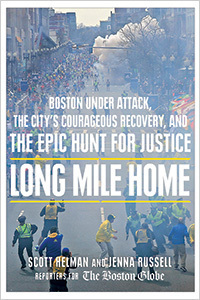 LONG MILE HOME: BOSTON UNDER ATTACK, THE CITY’S COURAGEOUS RECOVERY, AND THE EPIC HUNT FOR JUSTICE by Scott Helman and Jenna Russell
LONG MILE HOME: BOSTON UNDER ATTACK, THE CITY’S COURAGEOUS RECOVERY, AND THE EPIC HUNT FOR JUSTICE by Scott Helman and Jenna Russell
It’s incredibly hard to write this review, just as this is an incredibly hard book to read. Neither my off-the-mark review nor the difficulty of this book should keep you away, though. Why is it so difficult to write? After all, it’s not an unfamiliar subject. It’s not something I don’t know enough about, especially after reading. Yet, it’s something I haven’t felt as much as so many others.
Of course, tragedies like 2013’s Boston Marathon bombing touch everyone in the nation. We all feel it, to some degree. The degree I felt it may have been little – I didn’t know a single person from Boston ((this has changed since the bombing)), I’ve never been to city, before 2014, I’d hardly even heard of Copley Square.
What I do know a little bit about is running, even running a marathon. Granted, I’ve only ran one, not in Boston, but in Minnesota, but it was enough to understand just how much goes into Marathon Day. You train for months, maybe even a year. You test your muscles, push them to the extremes, reach their limits. You plan weeks ahead how to handle Marathon Day, where you’ll stay the night before, what to eat the morning of, how much you should run the day before, where you can expect your family to be standing. Even for the spectators the day of the marathon is a big deal: lawn chairs are set up, oranges, watermelons, water bottles, candies are bought to be passed out to the runners trooping by. Signs are painted, plans are made.
I don’t know if it’s true for everyone, but for me, there were points after the 20 mile mark where I hit that wall, thinking “I just need to stop here,” and realizing, I can’t. There’s a point in the race where you just can’t not get to the end. Your family’s waiting there. Your bags waiting there – cell phone included. Sure, you could stop on the road, but to get home, you need to cross that finish line.
I can’t imagine what it would feel like to hear you’re not even allowed to get to the end because a bomb has gone off.
It’s been a year, and still, the wounds feel so fresh. After all, victims of the bombings are still in rehabilitation, still mourning lost loved ones or lost limbs, still getting their lives back to normal, or at least to a new normal.
I’d have to say, for how fresh the wounds are, Long Mile Home is an amazingly balanced read. Written by two Boston Globe reporters, authors Jenna Russell and Scott Helman keep a remarkable cool under the subject of their book.
Memories of lost ones are apt memorials – recognizing the people for who they were, never resorting to martyring or putting people on undeserved pedestals. Stories from survivors (including Heather Abbott, a woman forced to make the decision whether or not to keep her foot and lower leg, and if not, just how much to let go) and those at the scene (race director Dave McGillivray; surgeon David King, who went straight from finishing the marathon in 3:12:00(ish) to saving lives in the hospital trauma center) are told firsthand, free from hyperbole and exaggerated emotions.
What I appreciated the most – the way authors handled the fact that the bombings were classified as an act of terrorism. Hisham Aidi talked very well about the way, just after the bombings before suspects were revealed and perpetrators were caught, Muslims around the country hoped in the deepest parts of their hearts that the bombers would be some WASP Americans, people tortured by mental illness or the like, rather than an Islmaic extremist acting on their own in last month’s Rebel Music – no true Muslims supported these actions, and they didn’t want the slow-forming scabs of 9/11 to be picked off by an incident like this.
Of course, as we know now, the bombers did unfortunately believe their actions were part of a larger religious cause, they were darker-skinned and had funny, foreign-sounding names, just pulling back the same feelings of hatred from a decade earlier. I truly, truly appreciated the way the authors cast the bombers a OUTSIDERS, boys with little to no connection to the actual religion of Islam, boys in troubled cycles of behavior. They even go on to point out the injustice done once the first videotapes of the brothers were released and internet witch hunts began, vigilantes naming innocents as the causer of the crime.
I don’t know how much more to say – you know the story, although not as well as you will after reading the book. It’s as fair and balanced as Fox News claims to be. It’s an incredibly hard read, mainly to stomach the whole story and all its details. I guess my best advice is to read it slowly, absorb as much as you can, and just pray for healing for the city.


April 10, 2014
New Non-Fiction: Twain, Twitter and Tsunamis
Hey Everyone,
Time for another blow-out, put these all up, quick! post from Kati. Like a fire sale, but with book information.
I don’t know all that much about the San Fran lit-scene (their noise-rock scene? call me, I’d love to chat), historically or otherwise, but this book gave an AMAZING account. It’s as if you got a press release of what’s happening that season not from a publishing company, but just a city itself.
So who’s it about? Or specifically, who’s these folks featured on the cover?
(1) Mark Twain. Really, inspiring stuff about how this guy was NOT even that well liked or received in America and how he was working at newspapers for much of his life. I think a lot of us (at least me) think this guy writes one book; fame is immediate. Not the case. Cool stuff to here.
(2) Bret Harte. A guy I’d never really known much about before this book; apparently a literary ‘golden boy’ with a little bit of an ego. Celebrated in his time, if not that importnat in the long run.
(3) Charles Warren Stoddard. The poor gay poet type. Really, a guy without a home, or any kind of place to call his own. I would have loved to see a story of how San Francisco SAVED HIM, gave him a refuge and all that, but…
(4) Ina Coolbrith. My new lit-hero and the girl I’m planning to read up on more. Seriously – it’s the 1860′s and this girl is organizing meetings and hanging out with TWAIN and all these other cool guys of lit! She reaches icon status.
It’s a interesting read, if hard at times to get a proper footing in the context. But, if you have interest in writers’ circles, how one author influences another, this will be right up your alley.
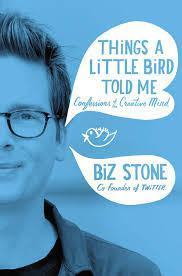 Biz Stone’s THINGS A LITTLE BIRD TOLD ME: CONFESSIONS OF A CREATIVE MIND
Biz Stone’s THINGS A LITTLE BIRD TOLD ME: CONFESSIONS OF A CREATIVE MIND
One of the major points of flack this book is getting: Biz Stone is a “co-founder” of Twitter, but it’s really hard to know what that means. And it’s not a totally unfair criticism; from the sounds of it, this guy was assigned to create a system of leaving status people could update from their phones, like Facebook with limited characters and simpler, and he (and his team of who knows who) did it. Don’t question how. He did.
If you can get over that fact, though, Things a Little Bird Told Me is a fun read. It’s the story of this sort-of self-depreciating dork finding his groove in Silicon Valley. Not exactly starting from a dorm room in Harvard, he created Twitter for a paying job (but really? doesn’t the phrase “from a dorm room in Harvard” imply enough proof that poverty is not at stake?) and just grew it from there.
Mixed throughout the story of Twitter’s humble and stumbling beginnings, as well as Stone’s own, are tales of Corporate Kumbaya, or how to work well in the workplace. Don’t get me wrong – that can sound condescending, but it’s totally not. Workplaces need more kumbaya. Offices in general should get along better if they’re gonna blow up like Twitter.
It’s not the most humble book or the most full-picture story like The Social Network may have been, but for fans of Twitter or anyone interested in the way this outlet can spread the news like wildfire, it’s an enjoyable read.
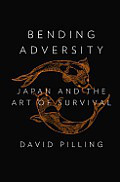 David Pilling’s BENDING ADVERSITY: JAPAN AND THE ART OF SURVIVAL
David Pilling’s BENDING ADVERSITY: JAPAN AND THE ART OF SURVIVAL
I’m always a bit hesitant with books that offer sweeping generalizations of an entire group of people, whether it be based on gender, race, age, generation, nationality, etc., ESPECIALLY if the person writing that book is outside the demographic in question. So for this book: David Pilling’s originally a Brit, spent years working/living in Japan, and still acknowledges the impossibility of summarizing a population.
That said, this book’s entirely a compliment to the people. Sure, it points out some aspects of the culture Americans/Brits might think “weird,” but overall, it leans to the fact that Japan is a country of contradictions, of people unwilling and unable to be easily packaged and explained.
Starting with the horrors of the 2011 tsunami that destroyed cities along the coast and set off a horrible nuclear reaction, Pilling explains why yes, the country may be down at the minute, but if the past offers any evidence, this nation is far from out. Think about it – both Germany and this island nation lost WWII; Germany’s never made quite the same economic impact as before the war; Japan’s doing just fine, innovating electronics, cars, etc. like the rest of us aren’t even there.
Basically, I loved this quote Pilling ended on, which really sums up the spirit of this whole thing the way a last sentence SHOULD every time: “Two ‘lost decades’ and its manifold problems notwithstanding, reports of Japan’s demise are exaggerated.”


April 8, 2014
Maggie Shipstead’s “Astonish Me.”
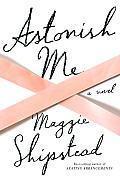 ASTONISH ME by Maggie Shipstead
ASTONISH ME by Maggie Shipstead
This novel is simply beautiful. I’ve yet to read Shipstead’s first novel Seating Arrangements, so I had little reference or preparation on just HOW GOOD Astonish Me would be, so I hope that’s different for you. The only criticism I need to get out right off the bat (and really, the only criticism I found throughout) is that Astonish Me isn’t a title that’s going to make you excited to pick this book up, and I hate that. I sort of wish that was a working title until she’d found something better suited for the story, but it is what it is. “Astonish Me” as a title tells you next to nothing; the story itself gives one of the most beautiful looks into family and love dynamics I’ve read this year/even longer than that.
Astonish Me starts like a blank slate, introducing characters into it’s world only piece by piece, never more than you can handle at once. Right off the bat, you’re thrown into the perfection-driven world of ballet, meeting two dancers, Joan and Elaine. I had to pause for a minute – I wanted to describe the pair as “two young dancers” – the girls are in their early twenties, after all, but in the world they inhabit, they’re already to the point that’s becoming aged.
Elaine’s a fierce dancer, ready to sell her soul and body over to the company, ready to cut out extras such as outside love interests and the excessive calories found in bread. And Joan – we never truly get a sense of just how good Joan really is; we just hear perhaps her “crowning achievement” is spending a short time as the love interest of the famous Russian dancer Arslan Rusakov – we just know that when it comes time to choose between staying with her passion, performing with her company, or keeping the bundle of cells reaching their way towards becoming a son, Joan choses the latter: to end her life as a dancer and start a new life as a mother.
It’s CRAZY how life works for athletes like this. Think about gymnasts or ice skaters in the Olympics (until dance becomes an Olympic sport, these seem like the best points of reference) – they train their entire lives, which yes, may until be 16 years at that point, but for them, THEIR ENTIRE LIVES to catch a big break like the Olympics or a spot in the chorus of a company, and have what, eight years for a dancer, one Olympic season for a gymnast? This has been their focus forever – no fun on Saturdays, straight to the studio; pouring thousands into pointe shoes, the best instructors, the proper uniforms; no time for non-dance friends, no room for calories. And then at a ripe young age – maybe 25 if you don’t get injured, you just have to leave. You’re too old suddenly. Your body can’t work like the new girls. It’s a world of art I can’t fathom, to realize you’ve peaked before you’ve even fully grown. So yeah, every time I watch the Gabby Douglas’s or the new girls of Alvin Ailey I feel admiration, but also this sadness. What comes next for these girls? What do they do after they can’t do what they’ve been training for for years? Will we remember Gabby Douglas in 7 years time?
Joan moves out of New York, the epi-center of American dance, to Chicago, the home of Jacob, the father of her child and the man that has been devoted to her since middle school. From what we see of their history, Jacob’s spent years pining over Joan, picking her up from ballet practice, rubbing her sore muscles, catching up with her the day after she returns from dates with the most popular boys in school. He’s always been there for her – it’s a no-brainer he’ll start a new life with her and his child, Harry, as Jacob names him, instantly.
As Harry gets older, Joan’s passion for dance never wans. She opens a dance studio in their town where the best and the brightest flock, including her own son and their neighbor’s daughter, Chloe, a wild-at-heart girl and Harry’s best friend. Soon enough, Harry and Chloe’s stories begin to echo that of Joan and Jacob – feelings of love and longing, loyalty, and above all, a passion for their art.
It’s easy enough to say this novel is about ballet; I hope I can articulate it enough to you – this story reads like a ballet. Clean. Controlled. Beautiful. Oh my god, beautiful. Shipstead’s prose feels like, I can’t even explain it, it feels like it’s holding back, not necessarily because she’s scared to make the required leaps, but because she wants you to focus for the moment on the precision, the taut-ness of the sentence at hand. Of course, there are leaps of beauty, moments that you just want to highlight and remember forever, but like a ballet, you can’t fill the thing with it – readers like dancers would get exhausted, and no one would appreciate the grace of a plié if the girl was up their doing leaps and spins for the entire show. Jesus, though – the precision of this piece. It’s utterly incredible.



